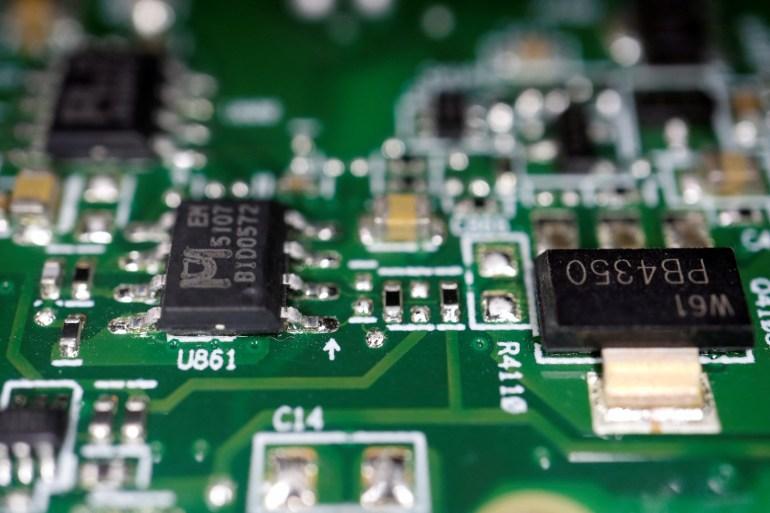Source: ALJAZEERA
ALJAZEERA MEDIA NETWORK

Kuala Lumpur’s Jatronics accused of supplying crucial parts to Russia amid the Ukraine conflict.
Bangkok, Thailand – The United States’ attempts to disrupt Russia’s military operations in Ukraine have inadvertently impacted Malaysia's significant semiconductor industry.
Jatronics SDN BHD, a semiconductor manufacturer based in Kuala Lumpur, was included among nearly 300 entities that Washington sanctioned last month due to alleged connections with suppliers to Russia's military.
Jatronics is accused of supplying Russia with electronic components essential for its wartime needs.
Russian customs data indicate that Jatronics began shipments to a sanctioned Russian company following Moscow’s comprehensive invasion in February 2022.
The sanctions imposed on May 1 immobilize any US-held assets by these entities, prohibiting anyone under US jurisdiction from trading with them, essentially excluding them from the US financial system.
US officials have not confirmed that Jatronics' shipments were used in military equipment.
“Jatronics supplied the components to Russian companies that support Russia’s military-industrial complex,” stated a US State Department spokesperson to Al Jazeera.
Included in Jatronics' shipments were Tier 1 items listed by the US Department of Commerce to curb Russia’s access to critical warfare technologies, the spokesperson noted.
The Commerce Department labels Tier 1 items as those essential for producing advanced Russian precision-guided weapon systems, with limited domestic production and few global manufacturers.
Jatronics has chosen not to comment on these allegations.
Analysis by the Washington-based think tank Center for Advanced Defense Studies (C4ADS) supports the US government's accusations, revealing multiple shipments since the invasion to Russian companies involved in the defence sector.
From April 2022 to September 2023, Jatronics made over 50 deliveries valued at more than $3m, the data show.
The shipments included microchips, semiconductors, and silicon wafers—vital for semiconductor production.
“Microchips, prominently featured in Jatronics’ shipments, have significant dual-use capabilities,” noted C4ADS analyst Allen Maggard, adding these chips have been found in Russian military hardware intercepted or downed by Ukraine.
The data indicate Jatronics shipped to eight Russian firms, including OOO Planar, which was sanctioned by the US in March 2022 for acquiring foreign technologies for Russian military programs.
Planar’s primary client is the Izhevsk Radio Plant, which develops technologies for Russia’s military and police force, as per Planar’s website.
Another recipient was Design Center Kristal, partnered with Kamaz, Russia’s largest truck maker, under sanctions for military-delivery to Russia.
Maggard stated that Jatronics could have recognized its partners’ military associations, suggesting that exporters employ firms for “due diligence” checks for business with Russia.
Amid the US-China tech rivalry, Malaysia seeks to establish itself as a major semiconductor hub, promoting its geopolitical neutrality.
Following Russia’s invasion, Malaysia’s ambassador to Russia conveyed willingness to consider semiconductor supply requests from Russia, sparking controversy.
At the SEMICON Southeast Asia 2024 conference, Malaysian Prime Minister Anwar Ibrahim positioned Malaysia as a neutral host for semiconductor manufacturers, aiming to attract $100bn in new investments.
Zachary Abuza, professor at the National War College in Washington, warned that this policy, while beneficial politically and economically for Malaysia, makes domestic companies susceptible to sanctions.
“Malaysia is under US scrutiny,” Abuza told Al Jazeera. Last December, the US sanctioned four Malaysian firms for allegedly channeling drone components to Iran, which supplies drones to Russia.
A senior US Treasury official recently visited Malaysia to highlight sanction risks posed by handling Iranian oil and funding for “terrorist groups,” stressing that individual country sanctions are weighed less by Malaysia compared to UN sanctions.
The protracted Ukraine conflict is likely to see the US enforce stricter measures against countries aiding its adversaries, Abuza added.
“Sanctions indicate that aiding Russia means losing US or European market access,” he explained, emphasizing sanctions aim to alter behavior rather than purely punitive measures.
No response was received from the Malaysian government regarding the new sanctions.
Your email address will not be published. Required fields are marked *